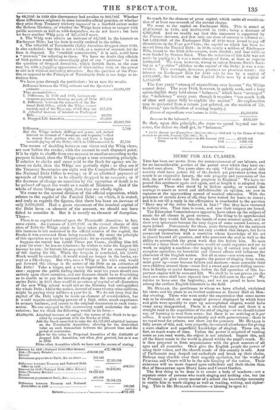MUSIC FOR ALL CLASSES.
Tins has been our motto from the commencement of our labours, and for no inconsiderable portion of the period over which they have ex- tended ours alone. Ten years since we said, "Until the people of this country shall have gotten rid of the foolish yet prevalent notion that music is an expensive luxury, the sole property and possession of the rich, the art will make but little progress in England." We have re- peated this sentiment again and again, and at length it is adopted from authority. Those who stood by in listless apathy, or wanted the courage to assert so novel and unfashionable an opinion, are now in raptures at the approaching spread of musical education. With the prudence of certain Jews of old, they have waited for leave to assent ; and it is not till a reply in the affirmative is vouchsafed to the question "Have any of the rulers believed is him ?" that they have ventured to believe also. That time is come, and now their tongues are loosed. The Education Commissioners appear to have taken up the subject of music for all classes in good earnest. The thing to be apprehended was, that they would fall into the hands of some musical quack, and in their own ignorance become the easy dupes of some second Looina, or mere jobber. Fortunately for them, more fortunately for the subjects of their experiment, they have not only avoided this danger, but have connected themselves with a musician whose knowledge of his art is placed beyond all question, and who possesses the zeal as well as the ability to accomplish the great work that lies before him. No man without a large share of enthusiasm would or could organize and set to work so mighty a machine—for mighty it is ; if carried into full and complete operation, its beneficial and blessed effects will influence the character of the English nation. Not all at once—not even soon. The boys and girls now about to acquire the power of singing from notes, must grow up—must become fathers and mothers—must assemble their own children around them—must find a sweet and never-failing recrea- tion in family or social harmony, before the full operation of this im- portant engine will be seen and felt. 'We shall be in our graves ere the seed now sown shall have ripened into " the full corn in the ear." We rejoice to have seen the beginning, and we are proud to have been among the earliest English labourers in the field.
Mr. Ilusn..tis, the gentleman to whom we have alluded, explained his views and his plans to an invited audience at Exeter Hall on Mon- day evening. Those who went under the expectation that some secret was to be revealed, or some magical process displayed by which boys and girls were speedily to start up accomplished singers, would have come away disappointed. There is a crooked road and there is a straight road to the acquisition of the art of singing—or we should rather say, of learning to read from notes ; but there is no arriving at it per wham. It must be traversed patiently and with perseverance : there is no royal road for princes, nor short cut for peasants. Mr. Humes is fully aware of this, and, very properly, denounced all schemes for giving a mere shallow and superficial knowledge of singing. These are, in fact, so much waste of time. Unless the power is acquired of reading notes as you read words, the object is not attained. Impart this, and all the finest music in the world is placed within the pupil's reach. He is then prepared to form acquaintance with the great masters of all ages and all countries. Once give the English people the power of using their voices, and the church music of this country is safe. Acts of Parliament may despoil our cathedrals and break up their choirs, Bishops may chuckle over their ungodly spoliation, but the works of PURCELL and Cnorr will be in the safe keeping of the nation. Their existence will no more depend upon cathedrals and their choirs than that of SHAKSPERE upon Drury Lane and Covent Garden.
The first thing to be done is to create a body of teachers—not a separate order of persons who teach singing and nothing else, but (as in Prussia) to give every master of a school the knowledge necessary to enable him to teach singing as well as reading, writing, and cipher- ing, This is Mr. linkr...sa s vocation—a blessing be upon ill


























 Previous page
Previous page